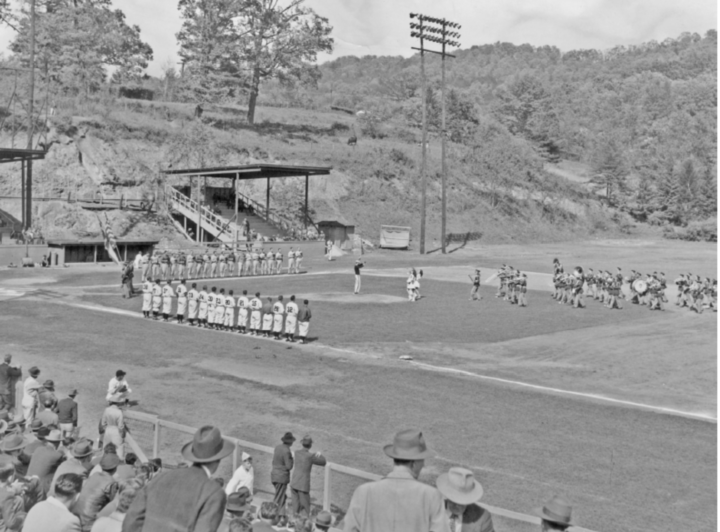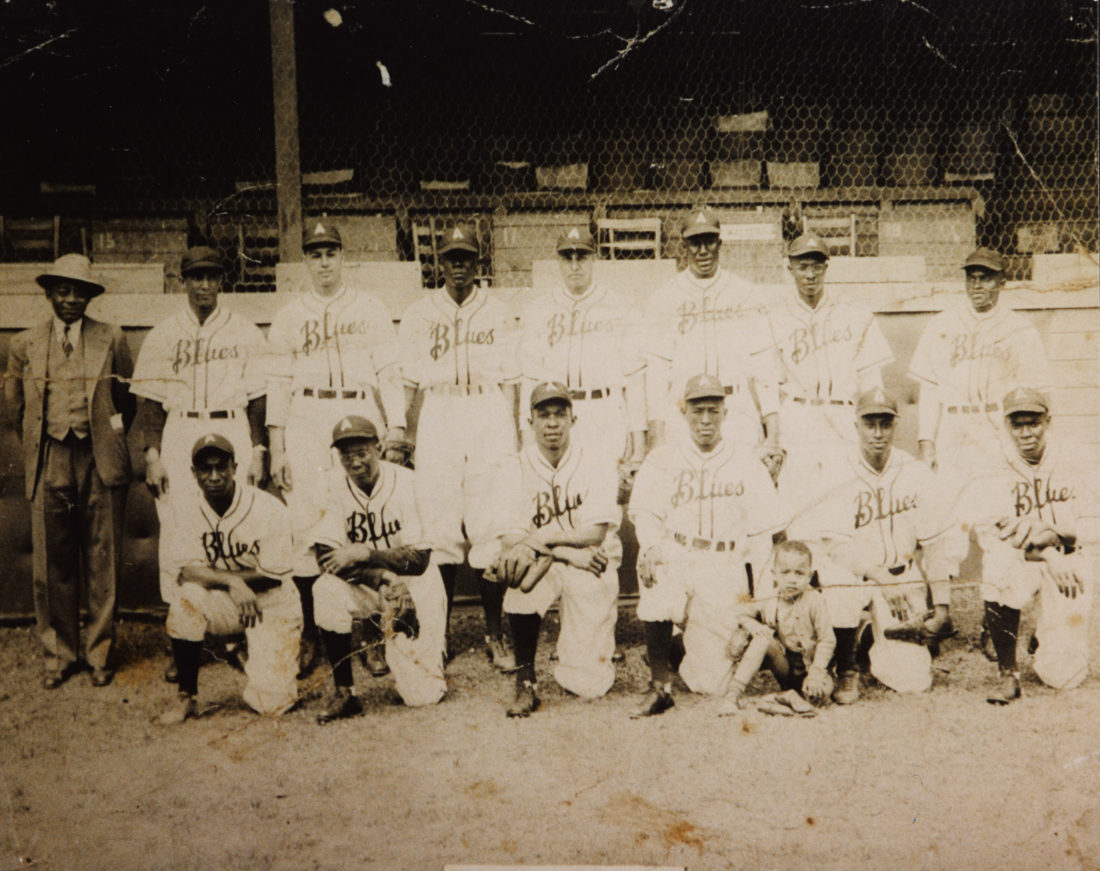Baseball fever gripped Asheville on Aug. 31, 1946.
The Asheville Blues were hosting the Atlanta Black Crackers in a game that would determine the second-half champion of the Negro Southern League. Fans who wanted to make sure they got seats for the 8:15 p.m. contest could buy a ticket for $1 at Miller’s Barber Shop on Eagle Street in the city’s vibrant Black business district. The Army department store at 35 Patton Ave. was also selling tickets.
“To handle the large crowd expected for the game, gates at McCormick Field will be opened at 6:30 o’clock,” The Asheville Citizen reported that day.
Then the paper noted, in a casual aside that jars the modern reader: “A special section of stands will be reserved for white fans.”
Long history
The Blues, who would go on to win that highly anticipated matchup with Atlanta, were part of a long tradition of all-Black semiprofessional teams that called Asheville home in the years before Jackie Robinson broke Major League Baseball’s color barrier.
The Asheville Royal Giants were established by Edward W. Pearson in 1916 and played into the 1920s. The Black Tourists took the field in 1929 and played throughout the 1930s.
Finally, former Black Tourists player/manager C.L. Moore took over ownership of the independent team in 1944 and renamed it the Blues.
The Blues existed for more than a decade, but the team’s heyday was 1945-47 as a founding member of the Negro Southern League along with the Charlotte Black Hornets, Chattanooga Choo Choos, New Orleans Creoles and others. The Blues were champions of the league in 1946 and 1947 and widely considered one of the best minor league Black teams in the country.
Sportswriter J.C. Chunn of the New York Amsterdam News even dubbed them the “wonder team of the Carolinas” because of their propensity for beating teams from larger cities.
“The Blues were a pretty big deal in the community, and I think a source of pride as well,” says Bill Ballew, author of A History of Professional Baseball in Asheville. He points out that the (white) Tourists had disbanded from 1943-45 because of World War II, leaving Moore’s squad the only game in town for a few seasons.
Ballew says exact attendance figures are hard to find, but he has seen accounts of 2,000 or more people going to Blues games at a time when McCormick Field held about 3,000 patrons.
One indication of the team’s community importance can be seen by the support offered by local businesses. Before the season opener in 1946, for example, the Citizen reported Scott’s Lunch on Eagle Street would award a $5 meal ticket to the player who hit the season’s first home run. Another Eagle Street business, Slow’s Recreation Parlor, would give $5 for the first triple, and Mitchell’s Valet Shop on Brick Street would shell out a whopping $50 (about $760 in today’s dollars) to the pitcher who hurled the season’s first no-hitter.
Other businesses getting in on the action that season were Boston’s Downtown Cafe on Short Ivy Street, the James-Keys Hotel on Southside Avenue, McGuire’s Tea Room on North Lexington Avenue and Reliable Loan Office on Biltmore Avenue.
In addition to 30 or so league games each season, the Blues played — and often won — exhibition contests against teams from the Black major leagues. Frequent opponents included the powerful Homestead Grays (who split their home games between Washington, D.C. and Pittsburgh) and Baltimore Elite Giants of the Negro National League, as well as the Birmingham Black Barons of the Negro American League.
Those games brought future Hall of Famers like Josh Gibson, Roy Campanella, Cool Papa Bell and Buck Leonard to McCormick Field. A 1945 Citizen article previewing a game against the Grays played up the presence of Gibson, Bell and Leonard, saying fans would have a chance to see “some of the most sensational stars in baseball.”
Local legend
The team’s success can largely be attributed to owner-manager Moore, who had an astute eye for top talent from across the Southeast. His finds included future major leaguers Bill Greason, who played for the St. Louis Cardinals in 1954, and outfielder Jim Pendleton, who played several seasons for the Milwaukee Braves, Pittsburgh Pirates, Cincinnati Reds and Houston Colt .45s.
The hard-hitting Pendleton was one of the key players on the Blues championship squads of 1946 and 1947. “I knew a pitcher named Vernon Phillips from Lenoir who had just gotten out of the Army,” Moore told the Citizen-Times in 1980. “He told me about a ballplayer he met in the service. He said I should sign Jim Pendleton right away.”
Other top Blues players included pitcher Bob Bowman and third baseman Herman Taylor.
“They had major league potential, but by the time Jackie Robinson broke in in 1947, they were too old to take a chance on,” Moore said in 1980.

An Arkansas native, Moore played professional baseball for the Chicago Union Giants, Atlantic City Bacharach Giants and others before coming to Asheville in 1935 to coach football at Stephens-Lee High School, the area’s all-Black secondary school. After leaving the school for a time, he returned in the late 1940s and coached multiple sports until its closure in 1965. He also served as athletic director at Stephens-Lee.
Moore’s success as a coach made him a legend in high school athletics. His teams won the 1957 state championship in football and 1962 title in basketball, and he sent more than 100 students to college on athletic scholarships. He was inducted into the WNC Sports Hall of Fame in 1983 and the N.C. High School Athletic Association Hall of Fame in 1992, the year he died.
After he retired as an educator in the early 1970s, Moore spent many years as a leader in the Black community, says longtime Asheville civil rights activist Matthew Bacoate, who knew Moore and took classes from his wife in high school. During the 1970s, Moore and three other retired men became a de facto committee that worked on initiatives to bring about more equity in education, recreation and other areas.
“Also, the city manager and various people on City Council would utilize them if they needed advice on some issue that dealt with race,” Bacoate says.
Struck out
The Blues left the Negro Southern League in 1948 and played briefly in the new Negro American Association, along with regional teams from Greensboro, Durham and Winston-Salem. The team lost the league’s championship series to the Raleigh Tigers in 1948.
By the 1950s, as the major and minor leagues continued to integrate, interest in Black baseball faded, and countless Black teams went under. The Blues were no exception.
Local media coverage of the Blues plummeted after about 1950, so exact details about the team’s demise are spotty. But in May 1956, the Citizen wrote: “The Asheville Blues, a local entry in Negro professional baseball a few years back, are being organized again by C.L. Moore, coach of Stephens-Lee High School and former skipper of the Blues.”
This time, no local businesses were offering prizes to players, and the paper didn’t forecast large crowds. What happened after that is unclear, as the Citizen never again wrote about Moore’s effort to bring back the Blues.
The team was largely forgotten for decades. In recent years, however, researchers of Black baseball have shown a renewed interest in the Blues and their championship years.
A 2012 article in the journal Black Ball, “Wonder Team of the Carolinas,” gives a thorough account of the team’s history and features interviews with Moore’s sons and others. “For more than a decade in the 1940s and 1950s, Clarence L. Moore’s Asheville Blues were among the most successful professional black baseball teams operating outside the acknowledged black major leagues,” author Pamela Mitchem writes.
Among the fascinating details in Mitchem’s article: The Blues traveled to away games on a blue bus called “The Goose.” As Black men in the segregated South, they often slept on the bus. In bigger towns, they stayed at the local Black YMCA or a Black hotel.
“Clarence Moore Jr. recalls there were few places African-Americans could stop and eat or even buy food while traveling,” Mitchem writes. “In order to get groceries while on the road, the team would often stop the bus just out of sight of a store and send one or two of the lighter-skinned players to go buy the food.”
At McCormick Field, Moore’s sons ran the scoreboard, and his wife, math teacher Sadie Moore, took the tickets and counted the proceeds, Mitchem writes.
And in 2020, the National Baseball Hall of Fame featured an article about the team (avl.mx/b8p) on its website, further shining light on a forgotten era.
“The Blues are an important part of Asheville’s history, both on the baseball field and in the community,” says local baseball historian Ballew. “The Blues were a talented team with a loyal fan base who generated a lot of joy and excitement, which is what the game of baseball is all about.”






Before you comment
The comments section is here to provide a platform for civil dialogue on the issues we face together as a local community. Xpress is committed to offering this platform for all voices, but when the tone of the discussion gets nasty or strays off topic, we believe many people choose not to participate. Xpress editors are determined to moderate comments to ensure a constructive interchange is maintained. All comments judged not to be in keeping with the spirit of civil discourse will be removed and repeat violators will be banned. See here for our terms of service. Thank you for being part of this effort to promote respectful discussion.